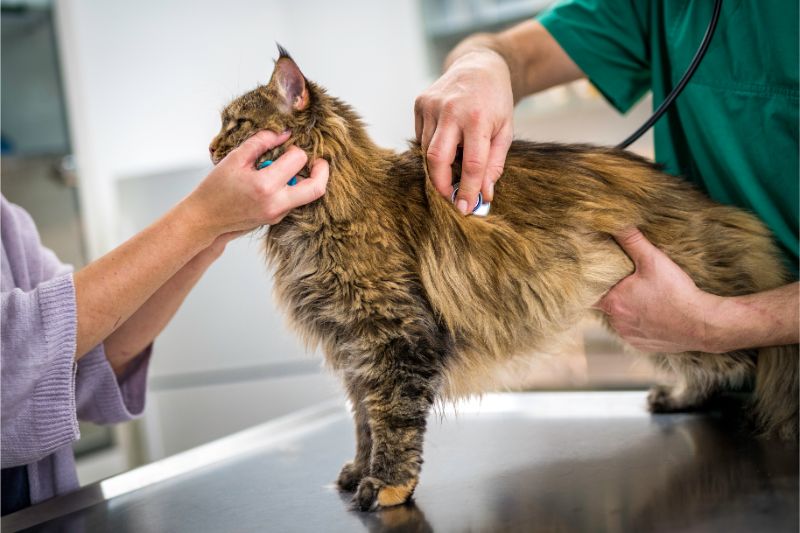Posts in Category: Pet Health & Wellness
Traveling with Your Pet Safely
A change in seasons means new possibilities for traveling and vacationing with your family. Whether your travels are by air or by car, you want to keep safety as your top priority. This is especially important if you are traveling with your pets! The team at Volunteer Veterinary Hospital has put together the essential safety tips for traveling with your pets:
Continue…How to Do Your Part to Prevent Zoonotic Diseases in Pets
Zoonotic diseases have been a growing concern for both humans and animals. We have heard a lot recently about these diseases that are transmitted from wildlife to people and pets. There is currently much more of a spotlight on diseases, particularly viruses, that mutate and affect other species.
This is why the team at Volunteer Veterinary Hospital is here with some insight into how to protect everyone from these serious diseases.
Continue…The Buzz on Pollen Allergies in Dogs
If you notice your pet scratching a lot more than usual or biting at their paws and legs, chances are they have allergies. Spring is a beautiful time for budding trees and blooming plants, but it’s also the bane of most allergy sufferers. Your pet can also experience seasonal allergies, which can cause a variety of uncomfortable symptoms.
Volunteer Veterinary Hospital is here to explain more about pollen allergies in dogs and what you can do to relieve the itchy-scratchy for your pooch:
Continue…What the Heck Is a Reverse Sneeze?
Certain dog behaviors can vacillate between alarming and confounding, and it’s not always clear when dog owners need to act. Sometimes, behaviors are temporary and resolve quickly, like a sudden upset tummy after eating something questionable. Other events that affect dogs can be more worrisome, especially if symptoms persist.
A reverse sneeze, or paroxysmal respiration, is one such episode that can be equally frightening and confusing. But what exactly are we talking about?
Continue…Paw Problems in Pets

As your family veterinarian, our staff at Volunteer Veterinary Hospital cares for your pet from head to toe… literally. We diagnose and treat a wide range of diseases and issues, but issues with the feet are not an uncommon reason that people bring their beloved animals to see us.
Thankfully, many paw problems in pets are very treatable and with our help we can get your furry friend putting their best paw forward in no time.
Continue…Start Scratching! Recognizing Seasonal Allergies in Pets

Has your pet been unusually itchy lately, pawing on their face or constantly scratching? They may be dealing with allergies. While many of us deal with the usual spring sneeze-fest, seasonal allergies in pets may manifest in ways that pet owners may not assign to allergies.
Let’s take a closer look at pet allergies, their symptoms, and how we can work together to relieve the discomfort for your fur friend.
Seasonal Allergies in Pets
Seasonal allergies are also called environmental allergies, atopy, and airborne allergies. An allergy is an overreaction to an allergen, which can include those that are present in the air or environment.
Continue…What the Hack! What Causes Hairballs in Cats?

The sound is unmistakable. You are in the kitchen and look over to see your cat crouching and backing up, and then that sound! You know the one. The hacking you hear usually is followed up by saliva, vomit, and much to your dismay, a giant gob of fur. Yuck, right?
Hairballs in cats are a common problem among felines (and their owners who have to clean up the mess). But what causes these yucky balls of fur, and why are some cats more prone to them? The team at Volunteer Veterinary Hospital is here to explain.
What Is a Hairball?
Cats self-groom, which means that they ingest hair and debris on the coat. This fur normally passes through the digestive system without any problems, but over time, some hair gathers in the GI tract.
A Spoonful of Sugar? Tricks for Giving Your Pet Medications

When it comes to taking care of your pet, it is definitely a team effort. Of course, you get the best possible care from the staff at Volunteer Veterinary Hospital, but many times treatments extend beyond the walls of our location.
When you are instructed to monitor or treat your pet, it is often imperative to your pet’s well-being that you follow our directions. This can be easier said than done, though, especially for pets who hate taking their pills.
Not to worry! When it comes to giving your pet medications, we have all the tricks.
Continue…It’s Always a Good Time to Focus on Cat Wellness

Everyone knows cats can take care of themselves. Sure, they might benefit from owner intervention occasionally but, generally speaking, they don’t need any support, right?
No way!
Unfortunately, cats are wrongly perceived as highly self-reliant, but they absolutely require and deserve special care and attention every single day. While there’s a lot cat owners can do on a daily basis at home, feline health depends on disease prevention, early detection, and effective treatment.
Together, a proactive approach to cat wellness can transform how these incredible pets are cared for.
Continue…The Mangy Mutt and Other Dog Skin Conditions You Should Know

Perhaps one of the most common reasons that dogs visit us at Volunteer Veterinary Hospital is skin trouble. From fleas to allergies to bacterial infections and everything in between, dogs and dermatological issues go together whether we like it or not. Some dog skin conditions are more common than others, though. It is important for pet owners to have a read on the types of issues that occur and why it’s important that we see your pet when skin trouble erupts.
The Common Culprits
There are entire textbooks devoted to doggy dermatology – not surprising as there are so many skin conditions that can and do occur. Some dog skin conditions are more common than others, though. A few of the more common problems we diagnose include:





